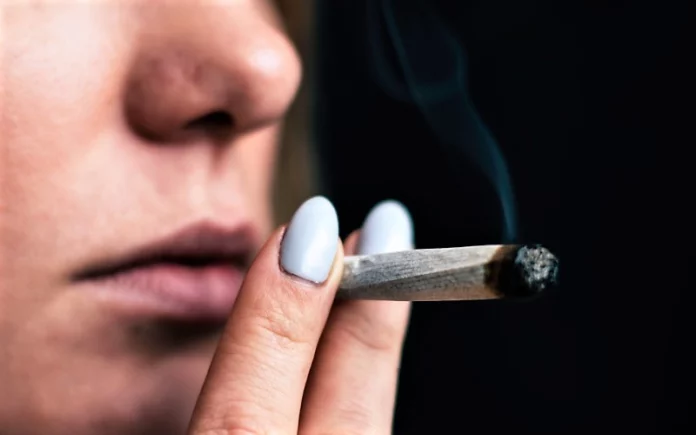LONDON – When Kenza was 20-years-old and studying law at a London university, she would come back to her room at three in the morning, her mind racing, and find herself unable to sleep. Her male university friends were smoking weed, so she tried it – enjoying how relaxed it made her feel. Before long, “it became literally the only way I could physically shut down my brain from thinking about case law,” she says. Ten years on, and Kenza – who has worked in some of the city’s top law firms and banks, and recently joined an environmental start-up – smokes a joint most evenings to “unwind” from a hectic day’s work and an equally busy social life.
She is one of London’s many high-powered female smokers, who are paying particular attention to the progress made by the London mayor, Sadiq Khan’s Drugs Commission, the first body of its kind to consider the outcomes of various drug policies from around the world – in particular those relating to cannabis, a class B drug. 2019 polling found that 63 per cent of those in London were in favour of legalising it, emulating countries such as Canada and Thailand, as well as 19 American states, including California, New York and Washington. The possession of cannabis has been decriminalised in Amsterdam since the ’70s, with recreational use “tolerated” across the country, while Portugal – which decriminalised all drugs in 2001 – is considering legalising cannabis altogether. (To decriminalise a drug simply means that its possession cannot result in criminal charges; to legalise it involves removing all penalties, including fines, associated with its use.)
For many cannabis smokers, legal regulation for recreational use would help shift some of the stigma around being a “stoner”, which is so often depicted negatively in film and TV. Think stereotypical “deadbeat” characters who speak slowly and get nothing done, from “his Dudeness”, the ageing hippie played by Jeff Bridges in The Big Lebowski, to Seth Rogen’s slacker stoner in Knocked Up.
“People who smoke weed onscreen are never portrayed as functioning adults,” says Kenza. “And I think that really shapes the narrative around weed smokers; people think we’re bums or criminals with nothing going on in our lives.” And they are almost exclusively male. “The only female smoker I’ve seen on screen was in Top Boy,” she continues, referring to the gang member played by Jasmine Jobson. Kenza also gets frustrated with “media scaremongering”, which has meant that older generations assume that cannabis is a “gateway drug” and that she will “end up a crack addict” – something her own parents have worried about.
Meanwhile, Lucie, 29, who works in London property, smokes up to twice a weekend with her partner as an alternative to alcohol, allowing her to be “light, happy and relaxed” without feeling groggy the next day. “The females that smoke in shows, like Zendaya in Euphoria, are portrayed as helpless young women, with problems at home,” she notes. “There is always a negative story behind it.” Lucie tends to keep the fact that she smokes private, but when she has told people, there is often surprise or judgment – particularly from other women. “I am a together, well-rounded, active person who goes into the office regularly, to the gym five times a week, and is on top of my social and professional life,” she says, “People just think it’s a drug habit that means you are either unambitious or that you have mental health issues.”
In fact, for many of these London women, cannabis is integral to maintaining their physical and mental health. For Rachel, a senior philanthropy manager at a major UK charity who smokes up to three times a week, cannabis “relieves the intensity of contemporary culture”, and its anti-inflammatory properties help calm her migraines as well as her psoriasis. She combines smoking with a body spray she makes at home mixing cannabis with oil, for when she has a flare up. Azra, a GP and private physician who smokes every evening after work, says she uses weed to help calm her anxiety, and temper her “high levels of emotion”.
The health impact of cannabis is still hotly contested by both sides of the political divide. While medical cannabis was legalised in the UK in November 2018, it is incredibly difficult to access. Studies are constantly linking it to harmful side effects such as high blood pressure, inflamed lungs, problems with memory and coordination as well as an increased risk of heart failure and psychotic illnesses. This is partially a result of cannabis getting a lot stronger, with the psychoactive chemical in herbal marijuana, THC, increasing by 14 per cent from 1970 to 2017, according to research by the University of Bath. “Skunk is an issue now,” says Saoirse, a 35-year-old finance and HR manager for four creative companies, who has been smoking for 20 years and has noticed the increase in strength. “That sht fcks minds, and that’s why people think stoners are dumb.”
On the flip side, research has also suggested it can help those suffering from epilepsy and cancer, and recommended it as a much safer alternative to pain relief than opiates. Studies have also found marijuana less detrimental to the brain than alcohol – the abuse of which is one of the biggest killers of working adults in the United Kingdom, according to government research. “It doesn’t make sense that weed is demonised, while we continue to glamourise and normalise the use and abuse of alcohol,” says Kenza. According to Statista, there were just 36 cannabis-related deaths in 2020 in the UK, compared to 8,974 alcohol-related deaths for the same year.
Cannabis – which is thought to have originated in central Asia before 10,000 BC – has long been used medicinally across the world. In the UK, Queen Victoria was prescribed cannabis by her physician to relieve the pain from her menstrual cramps. While cannabis became illegal in the UK in 1928, doctors were able to prescribe cannabis for medical use up until 1971, when the Misuse of Drugs Act came into force, labelling drugs as either class A, B or C.
The UK’s conservative attitudes towards the drug were largely influenced by media propaganda and racism, with politicians claiming that cannabis was causing “madness” abroad. American media mogul William Randolph Hearst was also using his tabloids to run a smear campaign against hemp (a variety of the cannabis plant). Hemp fibres (found in the plant’s stem) were found to be a cheaper, more durable alternative to wood pulp for producing paper, but Hearst had significant investments within the timber industry, so he published painfully racist articles that described marijuana as inducing minorities to “take advantage of white women” and create “satanic music” known as jazz. With panic heightened, cannabis was criminalised in the US in 1937.
“It was literally criminalised to stunt the progression of Black culture,” says Kenza, who still finds that much of the stigma smokers face is from “predominantly white circles, often outside the M25, whereas me and most of my friends are people of colour, and weed is normal in our cultures”. In 2021, analysis by the Liberal Democrats found that, in the UK, Black people are 12 times more likely to be prosecuted for cannabis than white people, with the maximum penalty for possession being five years imprisonment. “Lots of white, functioning politicians and bankers take cocaine and that’s accepted,” adds Kenza. “But weed is stigmatised because it’s associated with more marginalised members of society.”
So, if London were to legalise cannabis, what would the impact be for female smokers? “[Improved] health more than anything, because I really want what I smoke to be regulated by health professionals,” says Azra, who is concerned about the toxic and harmful chemicals that can be found in bad cannabis. Then there is physical safety to consider. Azra and Kenza, who live alone, would much rather not have to interact with drug dealers on a regular basis. “They are literally at my front door,” says Kenza. And they want to stop having to smoke in private. “I would love to be able to smoke in public spaces,” she says, while Rachel would like to better manage her chronic health conditions without “having a sense of shame around certain friends, family and colleagues that I am resorting to something illegal”.
All of the London women I speak to hope that decriminalising weed would help to reduce crime and imprisonment, and make better use of money spent on policing. “That money should be redirected to essential services supporting vulnerable people in London,” says Rachel, who would also like the product to be taxed.
According to one of Britain’s top think tanks Social Market Foundation, the illegal cannabis industry is currently worth more than £2 billion – money which is going to criminal gangs rather than back into the national economy through tax. Since Canada legalised cannabis in 2018, the industry has contributed $43.5 billion to its national GDP, and created 98,000 jobs.
But legalisation wouldn’t necessarily shift the judgment often directed towards female smokers on account of their gender. Only last month, Christine and the Queens (who, a couple of weeks later, changed their pronouns to “he/him”) responded to backlash from fans who took issue with the French artist smoking weed, calling out the “sexist” double standards. “You’re calling me ‘psychotic’… even though 80 per cent of the male artists you listen to smoke and much else besides.” And, while many men in the public eye – from Paul McCartney to Elon Musk – are known to smoke (with Musk even smoking on a podcast interview and Seth Rogan lighting up on live TV), it would be difficult to name many female celebrities who do so as easily.
“It would be great to have some cool female alternatives to the famous male weed smokers,” says Rachel. “The problem is societal, because women get judged differently to men for everything, from partying too much to being too aggressive in the office,” adds Kenza, whose ex-partner took issue with her smoking. “Socially, women are meant to aspire to marriage and motherhood – and for many people weed doesn’t really fit into that. But the more successful, ambitious and high-functioning women speak up about the benefits of cannabis as a positive lifestyle choice, then the more we can shake the stigma.”











